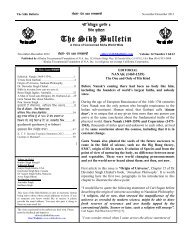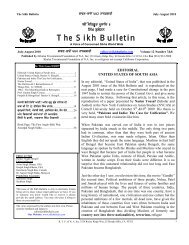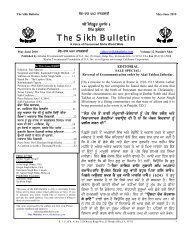Selected Editorials - The Sikh Bulletin
Selected Editorials - The Sikh Bulletin
Selected Editorials - The Sikh Bulletin
Create successful ePaper yourself
Turn your PDF publications into a flip-book with our unique Google optimized e-Paper software.
camp. It was their earnest desire that I should serve the congregation in ‘<strong>Sikh</strong>i Sarup’. I complied and<br />
even though now I have definite views on the matter and the Roseville Gurdwara has been closed since<br />
April 2005, because the sangat was not supportive of the reforms that we were introducing, I have no<br />
intention of cutting my hair because I consider them part of my culture, not a religious requirement.<br />
I cannot reconcile with many practices of <strong>Sikh</strong>ism today with what they ought to be, key among them the<br />
issues of kes and definition of a <strong>Sikh</strong>. <strong>The</strong>se, just like any religion, are divisive. Guru Nanak was not a<br />
divider; he was a uniter. In an age when you ventured away from your neighborhood at your peril he<br />
travelled far and wide to every corner of India and to Ceylon, Tibet and Mecca beyond, regardless of what<br />
W. H. McLeod and his students assert.<br />
Guru Nanak was born into a Hindu household but with that faith <strong>Sikh</strong>ism shares almost nothing, not even<br />
the concept of One God. At a very young age he refused to wear the janeu (Hindu sacred thread worn by<br />
high caste males); discarded the caste system (a religiously sanctioned discrimination still entrenched in<br />
the 21 st century democratic India); preached against idol worship; recognized the equality of mankind;<br />
asserted the equality of men and women; condemned the Hindu practice of Sati (live immolation of<br />
widow on her husband’s funeral pyre); instructed the women to discard veil; allowed widow and widower<br />
remarriage; rejected the then prevalent concepts of karma, after life salvation, tapasya, heaven and hell<br />
(after death), incarnation, 84 lakh juni (8,400,000 life forms) yatra to holy places, fasting, multiple gods<br />
and goddesses; and of course, unique only to <strong>Sikh</strong>ism, wished ‘sarbat da bhala’ (wishing well being of<br />
all, not just of oneself, one’s own family or one’s own country) in his prayers. His was a faith of<br />
Universal Humanism. I, therefore’ am a Nanakpanthi as represented by the Gurbani of Shri Guru Granth<br />
Sahib ji.<br />
To the above we should add that Guru Nanak was an environmentalist half a millennium ahead of his<br />
time.<br />
ਪਵਣੁ1 ਗੁਰੂ2 ਪਾਣੀ 3 ਿਪਤਾ 4 ਮਾਤਾ 5 ਧਰਿਤ 6 ਮਹਤੁ7 ॥<br />
Pavaṇ gurū pāṇī piṯā māṯā ḏẖaraṯ mahaṯ.<br />
Air 1 is like a Guru 2 , water 3 like a father 4 and the Earth 6 like the great 7 mother 5 (which provides all types<br />
of resources and food).<br />
<strong>The</strong> quote above is taken from the article ‘EARTH DAY, ਮਾਤਾ ਧਰਿਤ ਮਹਤੁ, EARTH, THE GREAT<br />
MOTHER’ by Prof Devinder Singh Chahal, PhD in the following pages of this issue.<br />
<strong>The</strong> positions of Guru, Father and Mother are the most highly regarded in Indian culture. By associating<br />
those with the three most essential life support elements Guru Nanak wants people to show the same<br />
consideration to these elements as they do to the three human relationships. In other words, do nothing<br />
that will pollute them.<br />
His mission was to spread the message of common origins and brotherhood of mankind and importance<br />
of truthful living. Truth is higher than everything; but higher still is truthful living. ||5|| AGGS, M 1, p 62.<br />
Religions can be changed, voluntarily or by inducements as in Christianity and by the sword as in Islam,<br />
but truthful living does not have to change with change in faith.<br />
I firmly believe that Guru Nanak and Guru Granth are not for starting a new religion. <strong>Sikh</strong>ism is a way of<br />
life. Whereas religions compartmentalize people, <strong>Sikh</strong>ism breaks those barriers.<br />
An excellent example of that is the incorporation of writings of both Hindus and Muslims that are<br />
compatible with gurbani. It is true that the Christian Bible incorporates the Old Testament, the Jewish<br />
scripture, and Mohammed accepted the Jewish and Christian prophets; but that is all among the one<br />
82
















